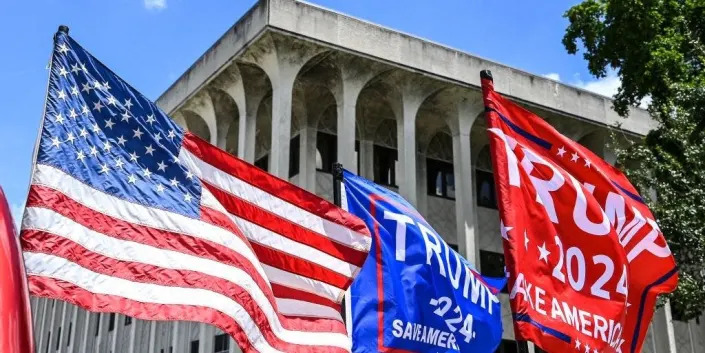
FILE - Attorney General William Barr appears before a House Appropriations subcommittee on Capitol Hill in Washington, April 9, 2019. The Justice Department under Attorney General William Barr improperly withheld portions of an internal memorandum Barr cited in publicly announcing that then-President Donald Trump had not committed obstruction of justice in the Russia investigation. That's the ruling by a federal appeals court Friday.
MEG KINNARD
Fri, August 19, 2022 at 10:38 AM·3 min read
The Justice Department under Attorney General William Barr improperly withheld portions of an internal memo Barr cited in announcing that then-President Donald Trump had not obstructed justice in the Russia investigation, a federal appeals panel said Friday.
The department had argued that the 2019 memo represented private deliberations of its lawyers before any decision was formalized, and was thus exempt from disclosure. A federal judge previously disagreed, ordering the Justice Department to provide it to a government transparency group that had sued for it.
At issue in the case is a March 24, 2019, memorandum from the head of the Justice Department’s Office of Legal Counsel and another senior department official that was prepared for Barr to evaluate whether evidence in special counsel Robert Mueller’s investigation could support prosecution of the president for obstruction of justice.
Barr has said he looked to that opinion in concluding that Trump did not illegally obstruct the Russia probe, which was an investigation of whether his campaign had colluded with Russia to tip the 2016 election.
A year later, a federal judge sharply rebuked Barr’s handling of Mueller's report, saying Barr had made “misleading public statements” to spin the investigation’s findings in favor of Trump and had shown a “lack of candor.”
Friday's appeals court decision said the internal Justice Department memo noted that “Mueller had declined to accuse President Trump of obstructing justice but also had declined to exonerate him.” The internal memo said “the Report’s failure to take a definitive position could be read to imply an accusation against President Trump” if released to the public, the court wrote.
The Justice Department turned over other documents to Citizens for Responsibility and Ethics in Washington as part of the group’s lawsuit, but declined to give it the memo. Government lawyers said they were entitled under public records law to withhold the memo because it reflected internal deliberations before any formal decision had been reached on what Mueller’s evidence showed.
Sitting presidents are generally protected from criminal charges on grounds it would undermine their ability to perform the office's constitutional duties. The Justice Department, like Mueller, “took as a given that the Constitution would bar the prosecution of a sitting President,” the appeals court wrote, which meant the decision that Trump wouldn't be charged had already been made and couldn't be shielded from public release.
Had Justice Department officials made clear to the court that the memo related to Barr's decision on making a public statement about the report, the appellate panel wrote, rulings in the case might have been different.
“Because the Department did not tie the memorandum to deliberations about the relevant decision, the Department failed to justify its reliance on the deliberative-process privilege,” wrote the panel of judges from the U.S. Court of Appeals for the District of Columbia Circuit.
Appellate judges also noted that their ruling was “narrow,” saying that it should not be interpreted to “call into question any of our precedents permitting agencies to withhold draft documents related to public messaging."
Attorneys for the Justice Department didn’t immediately respond to an email message seeking comment. The department can appeal the ruling to the full appeals court.
___
Meg Kinnard can be reached at http://twitter.com/MegKinnardAP.






















